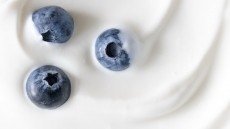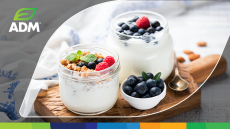New technology for caffeinated doughnuts
Carolina, has created a revolutionary technique for manufacturing
caffeine-laced doughnuts.
Early experiments with caffeinated baked goods failed due to the extremely bitter taste, however Bohannon has formulated a new caffeine encapsulation technology in which tiny particles of caffeine dissolve in the intestine, not in the mouth. In an interview with ConfectioneryNews.com, Bohannon said that the technology involves taking very small particles of caffeine and coating them with a vegetable like oil to make microencapsulated particles. They are small enough that the particle does not break apart while chewing, and the lipid coating prevents them from interacting with the bitter receptors on the tongue. These particles are normally used in a glaze for doughnuts, pastries or energy bars, but they can be baked for a short time within the cake itself. Each doughnut contains around 50mg of caffeine, which is about the same as 1 cup of coffee, Bohannon explained. He formulated the idea 6 years ago when eating his own breakfast. He realised that people who don't drink hot drinks are still likely to want an early morning kick-start, and for some, a mere cup of coffee is insufficient. "If someone needs that extra buzz to get going, they can wash down a Buzz Donut with a cup of coffee!" he said.However last year several reports raised concerns over caffeine consumption and the lack of industry regulations. The American Food and Drug Administration does not require that food labels indicate the amount of caffeine in a product, and it does not recommend a specific limit on caffeine consumption. Over consumption can lead to caffeine intoxication, which includes symptoms such as insomnia, heart palpitations, tremors, sweating, nausea, diarrhea, chest pain, and neurological symptoms. A review of records from a regional poison control center in Chicago by Danielle McCarthy, MD, found 265 cases of caffeine intoxication, including 31 hospitalizations and 20 ICU admissions. Most were made ill by caffeine in the form of dietary supplements, medications, and energy drinks, though in some cases alcohol and illegal drugs were also involved. Bohannon agreed that excess consumption of caffeine should be avoided, but he assured ConfectioneryNews.com that the amount of caffeine in his doughnuts posed no safety worries. "One can control the amount of caffeine introduced by regulating the amount used in the caffeinated frosting/glaze or by incorporating it into the batter at a set concentration. This would be done in the factory under supervision with quality control checks, just like any additive, such as sodium benzoate, a preservative, is done in commercial bakeries," he said. Furthermore, as one doughnut contains no more caffeine than a cup of coffee consumers would have to eat vast quantities before suffering any adverse affects. Bohannon has patented the encapsulating formula under the name Encaff, and uses it to create products such as Buzz Donuts, Buzzed Bagels and Buzz Bars. The products are not yet available, but he is currently in discussion with large national convenience store chains, and hopes to have the product on the market around October.











